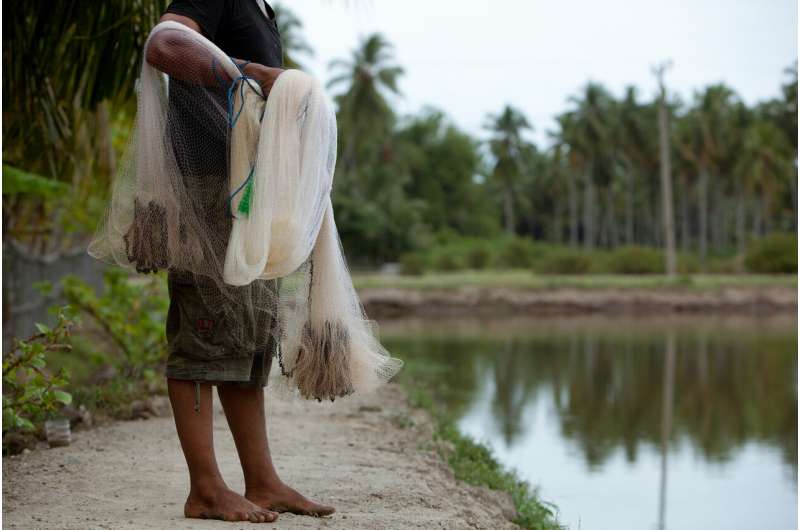COVID-19 has led to a decline in demand for fresh fish, causing fishers to fall into poverty. Credit: WorldFish (https://www.flickr.com/photos/theworldfishcenter/7654907108/in/album-72157669655644307/), CC BY-NC-ND 2.0 (https://creativecommons.org/licenses/by-nc-nd/2.0/)
Lockdown restrictions following the global spread of the COVID-19 pandemic have severely impacted fishing operations, processing, markets and supply chains, leaving those in low-income groups vulnerable to malnutrition and poverty, say the authors of a new study.
When the pandemic caused global lockdowns in March 2020 it disrupted the fish market supply chain on a global level, the ripple effects of which continue to be felt. The decline in demand for fresh fish has led to fewer wage opportunities while increased costs of transportation have led to either oversupply or wastage.
The global seafood market reached a value of US$159.31 billion in 2019, and is projected to reach about US$194 billion dollars by 2027. The study notes that the seafood system is a meshed network of formal and informal producers and distributors, retailers and consumers.
Developing countries, in particular, are exporting high volumes of seafood as part of poverty alleviation programs. According to the World Wildlife Fund, the developing world employ 97 percent of the world's fishing workforce with an overwhelming majority, 90 percent, are small-scale fishermen. The Food and Agriculture Organization estimated that about 200 million people were directly and indirectly employed along the value chain many of whom are women.
Published online by Global Food Security in February, the study highlights labor and production disruptions that affected the incomes of self-employed and casual workers based on analysis of data collected from official government agencies and market reporting. The entry of migrant fish workers into ports, in Thailand and India for example, were restricted while most fish markets were shut down.
Traders in India and Myanmar reported a 15 percent drop in fish prices after lockdowns were implemented. Though large-scale operators were eventually able to adapt, smaller operations especially from rural areas have had a harder time recovering due to limited access to technology and social protection programs.
Businesses in China, for example, shifted to frozen and processed seafood in response to consumers staying home and cooking more. Small to medium enterprises had a more difficult time pivoting without access to a network of consumers online and a reliable transportation system.
"With market disruptions people are not that likely to be fishing more, because they can't sell the product. One way to support the loss of income is setting up COVID-safe markets, through mobile apps for example, to minimize crowds. This has already been going on in the Philippines," explains Kate Barclay, professor of International Studies and Global Societies, University of Technology Sydney.
The disruptions led to a significant reduction in consumption of nutrient-dense foods like fish in low-income countries, with households shifting towards staple foods, according to the study. Small-scale farmers in Myanmar reported buying less food, especially animal-sourced food.
Since the fish sector is important in maintaining the global food chain, the authors of the study recommend longer-term adaptations over short-term coping mechanisms to safeguard against future volatilities. These include more investment in sustainable fishing and less reliance on food imports.
"Fish and other aquatic animals are a nutritious source of food, one that tends to be more affordable than meat or poultry. When we think about how to recover from this pandemic there needs to be more investment and support given that this sector is an important source of livelihood for so many people," says Ben Belton, a co-author of the study and senior scientist at WorldFish.
Belton also suggests social safety nets targeted at low-income groups and migrant workers.
"In a crisis like this there's actually very little formal support that people are able to access. If you lose your job or you're unable to continue your business, you don't have many options and may be forced to borrow informally. But if there were more of a social safety net in times of need, whether it be in the form of cheap loans or food, it could at least provide a bit of a buffer," says Belton.
One of the challenges for government and policy makers is identifying what kinds of support are effective at preserving businesses, income and food security while balancing sustainable practices.
"Policy measures taken to help fishers through these extremely difficult times should be designed to respond to the specific problems in a given context, and should keep the long-term sustainability of the sector in mind," says Alice Tipping, lead of fish subsidies at the International Institute for Sustainable Development.
"If a country is facing a drop off in fish supply because fishers are subject to lockdowns, providing general income support to the poorest sectors of the population may be the measure that best addresses the problem," Tipping says.
"If fishers are able to fish but demand is lacking, for example because restaurants are closed, the best way of supporting fishers is to give them money directly, rather than trying to prop them up by further reducing their fishing costs which is likely to encourage them to fish more than may be sustainable," she adds.
Provided by SciDev.Net
























